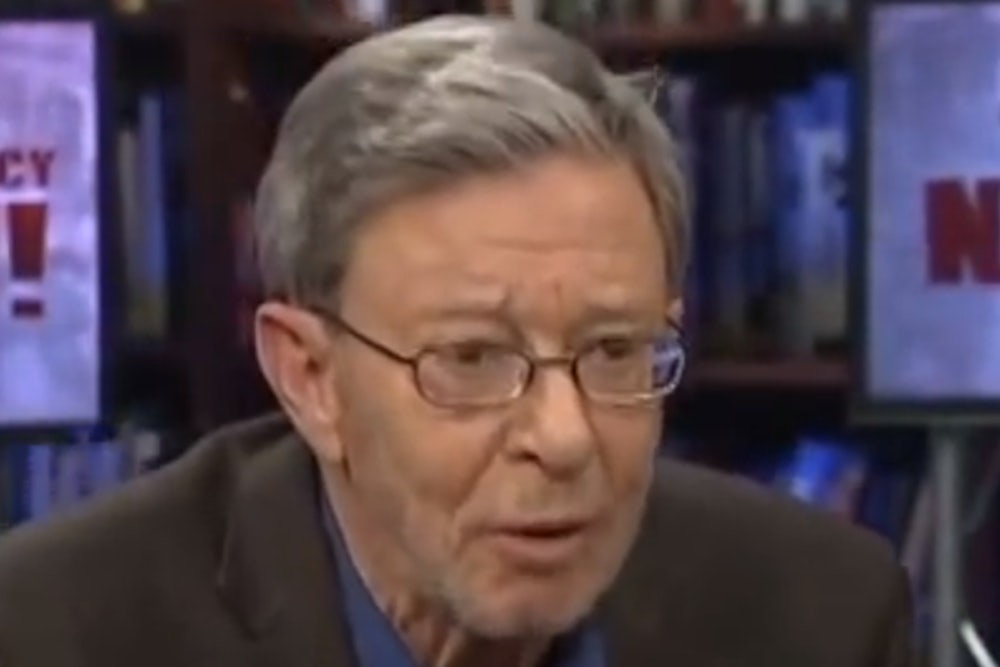Given that I don't watch much Russian state television, I naively assumed it would be possible (and even desirable) to go through an entire day without hearing a solid defense of Vladimir Putin's warmongering. But when confronted with the figure of NYU Professor Stephen F. Cohen, this becomes impossible. In a piece for The Nation and an appearance on Fareed Zakaria's CNN show, Cohen gave his best defense of Putin's Ukraine policy, and inadvertantly showed why making excuses for an autocratic regime makes the apologist look worst of all.
Cohen's discussion with Fareed Zakaria was brief but telling. After first denying that Putin was a "rank dictator" and saying that he is not "a thug" or "anti-American" (would Putin even deny this last bit anymore?), Cohen got to the main point of his argument:
Remember that was the second time in the 20th century that the Russian state had collapsed, the first time in 1917. So to recreate stability, prosperity, greatness, whatever that means in Russia at home and, in the process, restore Russia's traditional zones of national security on its borders, that means Ukraine as well. He did not create this Ukrainian crisis. It was imposed on him and he had no choice to react. That's where we stand today.
Notice that Cohen initially argues that some sort of control over Ukraine is a requirement of Russian greatness. And then, after explaining this, he says the whole crisis was "imposed" on Putin! This is apologetics done well: first you explain why bad behavior is actually sensisble, and then you say that the bad behavior wasn't really under the control of the bad actor.
Cohen also makes a comparison with the United States:
What if, suddenly, Russian power showed up in Canada and Mexico and provinces of Canada and Mexico said they were going to join Putin's Eurasian economic union and maybe even his military bloc? Surely the American president would have to react at least as forcefully as Putin has.
Zakaria, to his credit, pointed out that the United States would obviously not act similarly, but let's say (for fun) that Cohen is right and that the United States would in fact invade part of Canada in such a scenario. What would be Stephen Cohen's response? Would he get on television and explain American history, and American grievances, and American nationalism? Would he call for more "understanding" of American warmongering and aggression? Would he scold the liberal media for criticizing the United States? Of course not! He would be screaming at the top of his lungs about American imperialism and whichever bloodthirsty (albeit fairly elected) American leader happened to be in power.
And yet, as Cohen's commentary on television and piece in The Nation show, Cohen is not at all interested in scolding Putin. Rather, he wants to defend him from the evil American media. He begins the Nation piece shakily, claiming that "most American journalists still give the impression that Yeltsin was an ideal Russian leader." Is that so? Cohen's habit of not quoting his adversaries shines through here since this ridiculous claim is not followed up with any citations.
Cohen finally begins quoting people, or at least I think they are people, because he merely starts putting things in quote marks but not telling us where the quotes are from. So Putin is an "autocrat," for instance. (Is he arguing with this?) He adds:
And what of Barack Obama’s decision to send only a low-level delegation, including retired gay athletes, to Sochi? In August, Putin virtually saved Obama’s presidency by persuading Syrian President Bashar al-Assad to eliminate his chemical weapons. Putin then helped to facilitate Obama’s heralded opening to Iran. Should not Obama himself have gone to Sochi—either out of gratitude to Putin, or to stand with Russia’s leader against international terrorists who have struck both of our countries?
I didn't realize until now that The Nation felt it necessary to print someone who would sneer at Obama's decision to send retired gay athletes to a country that is cracking down on homosexuality. Nor, for that matter, have I ever read a piece in The Nation saying that an American president "should" stand with other world leaders who want to prosecute anti-terrorism, let alone Vladimir Putin's variety of anti-terrorism, which is somewhat less discriminate than our own. It's hard not to think that the only point of mentioning all this was to sneer at Obama and the American media. (Cohen also attacks, in clumsy and typically unspecific fashion, Julia Ioffe and her in-depth cover story for The New Republic about Russia.)
Cohen further adds:
The media therefore eagerly await Putin’s downfall—due to his “failing economy” (some of its indicators are better than US ones), the valor of street protesters and other right-minded oppositionists (whose policies are rarely examined), the defection of his electorate (his approval ratings remain around 65 percent) or some welcomed “cataclysm.” Evidently believing, as does the Times, for example, that democrats and a “much better future” will succeed Putin (not zealous ultranationalists growing in the streets and corridors of power), US commentators remain indifferent to what the hoped-for “destabilization of his regime” might mean in the world’s largest nuclear country.
Notice, again, the quote marks without context. But I especially love the mention of Putin's popularity, as if Cohen thinks we should care deeply about the approval rating of someone who has helped stymie a free press, and cracked down mercilessly on all opposition and civil society. Presumably even Cohen would admit that you need a free press for people to be well informed about their leaders.
Or perhaps not. I suppose Cohen could offer himself as a defense. He is well-informed, and yet also completely clueless.
